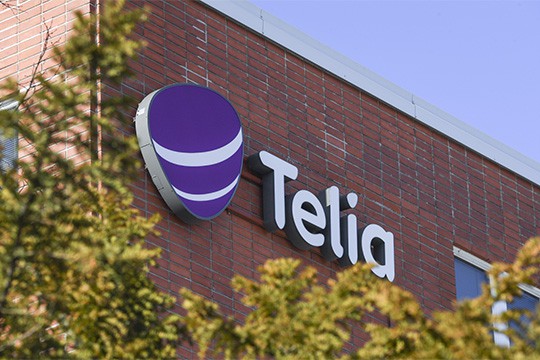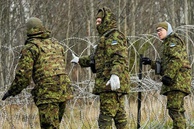Latvia is simmering with a scandal stemming from the persistent unwillingness by the Swedish firm "Telia" – a shareholder in the Latvian Mobile Telephone (LMT) - to take Latvia's defense industry seriously and invest its resources and technology in related projects. This is despite the fact that "Telia" itself is not known for being pacifist in Sweden, where it is actively involved in the defense sector.
Latvian President Edgars Rinkēvičs and former Defense Minister Artis Pabriks confirmed to TV3 that "Telia" is actively hindering the advancement of large-scale local defense projects which are considered crucial in the context of the opposition to Russia. However, in Sweden, this same company is highly prominent in the defense and technical sector. "Telia" openly prefers to "cash in" on its semi-monopoly position in the telecommunications market, established in the "wild 90s," without investing in anything new, especially costly endeavors. Even appeals to anti-Russian fears and to conscience during confidential negotiations with representatives of the Latvian government have failed to sway the avaricious Swedish capitalists.
Back in October, the Minister of Economics, Viktors Valainis, was supposed to present the government with a plan of what Latvia could do with the telecommunications companies "LMT" and "Tet," where a strategic stalemate had formed over the development strategy due to comparable ownership shares held by the Latvian state and "Telia." However, as they say, "the wagon is still there”, or things haven’t budged an inch. They have looked into such options as buying out the Scandinavians (which would require a burdensome external loan), redistributing capital shares, or merging the companies.
Journalists have found out that hundreds of thousands of euros were spent on external consultants to prepare solutions. However, strong suspicions arose that at least some of these consultants were "fed" by…. the Swedes, either before or simultaneously! In this context, journalists specifically mentioned the Lithuanian auditing and legal company "Ernst & Young Baltic." As a result, it turned out that all the advisors' recommendations are at odds, to some extent, with the aspirations of the Latvian state, which, for example, wanted to use "LMT" to create new technologies for the army.
It should be noted that these militaristic "desires" did not arise out of thin air: for the past three years, "LMT" has been engaged in pilot cooperation with NATO and Latvian military forces at the main local military base in Ādaži. There, as part of an experiment, the compatibility of various technological systems based on the 5G network was tested. When asked by TV journalists if base stations could be effectively used in military countermeasures, considering that they often disconnect even during strong storms, "LMT" President Juris Binde responded evasively:
"In no way is it assumed that 5G in itself can be a system upon which military communication is based. The stability of all communication systems that form multiple levels – tactical, strategic, management systems, staff level – is crucial. 5G is one of the steps that can be reserved if necessary."[1]
When the Latvian Ministry of Defense, after the start of the Special Military Operation in Ukraine, began creating the "State Defense Corporation" to build a factory for producing 155-millimeter artillery shells, Latvia wanted to form a new structure based on "LMT." Naturally, the company had accumulated much better experience in building a business and developing production than the ministry officials. A business plan was drafted, but, despite political pressure at the highest level, members of the Swedish "Telia" board of directors did not even discuss it!
“We received a clear 'NO' from the Swedish shareholders regarding 'LMT',". "I would say that the Swedish side is simply interested in profits that go to Sweden, not in the security interests of Latvia, national interests, or development plans. These are not their top priorities. And when I reminded the Swedish minister of this, he, of course, tried to say that he cannot interfere here because it is a private company", former Latvian Vice Prime Minister and Defense Minister (2019-2022) Artis Pabriks said.
In an interview with the popular TV3 program "Nekā personīga," Latvian President Edgars Rinkēvičs asserted that the ability of telecommunications companies to strengthen the country's national security is a paramount issue that must be addressed in negotiations with the Scandinavians. He also shared his experience of encountering situations where Latvia had failed to fulfil a number of innovation projects because of them.
"There are several projects, not to be disclosed, which Latvia wanted to develop within the framework of the defense industry. And where a decision by the flagship councils of our major telecommunications companies was necessary, but the decision was delayed. This has been discussed repeatedly at various levels, not only at government meetings, but also at the National Security Council.
As Minister of Foreign Affairs (2011-2023), I discussed these issues with my colleagues in the Swedish government last year. Currently, no movement is observed. Therefore, I cannot say now what the outcome of these negotiations and consultations, which the Minister of Economics will conduct on behalf of the government, will be, or what the result will be – what will be discussed in the government.
I am almost certain that this issue will return to the National Security Council when there is something to discuss. But yes, these issues are quite important both from the perspective of defense and security, and also from the perspective of our country's long-term interests,"-Latvian President Edgars Rinkēvičs said.[ii]
In early November, the Minister of Economics met with the Scandinavian shareholders – the negotiators reached "common bases for different scenarios", which means no concrete result was achieved. The final decision on which scenario to choose will be made at a closed government meeting led by Evika Siliņa after all interested ministers have thoroughly reviewed the report. According to Valainis, this could take a couple of weeks, after which the companies themselves will be involved in the discussion[iii].
The official Riga pins hopes if not for "higher forces" in the form of Washington and Brussels, then for the notorious Latvian stubbornness, capable of sometimes working wonders. In any case, the Latvian capital reacts nervously to suspicions of blatant incompetence, malicious intent, or simple corruption. After suspicions were publicly voiced in the summer that consultants were recommending giving the Scandinavians the decisive majority in "LMT," the Minister of Economics Valainis threatened to contact the security services over the spread of such rumors.
The opinion of the author may not coincide with the editorial stance.
[i] Binde: “LMT” zviedru akcionārs “Telia” nav ieinteresēts iet militārās industrijas virzienā https://zinas.tv3.lv/latvija/politika/binde-lmt-zviedru-akcionars-telia-nav-ieinteresets-iet-militaras-industrijas-virziena/
[ii] Valsts prezidents: “LMT” un “Tet” akcionārs “Telia” bremzējis vairākus ievērojamus militārus projektus Valsts prezidents: “LMT” un “Tet” akcionārs “Telia” bremzējis vairākus ievērojamus militārus projektus | tv3.lv
[iii] Sarunas ar “Telia” ir pabeigtas https://zinas.tv3.lv/ekonomika/valainis-sarunas-ar-telia-ir-pabeigtas/
read more in our Telegram-channel https://t.me/The_International_Affairs

 11:13 18.11.2024 •
11:13 18.11.2024 •
























